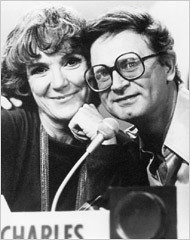R.I.P. Charles Nelson Reilly
Charles Nelson Reilly, Tony-Winning Comic Actor, Dies at 76
Charles Nelson Reilly, who acted and directed on Broadway but came to be best known for his campy television appearances on talk shows and “Match Game,” died on Friday in Los Angeles. He was 76 and lived in Beverly Hills, Calif.
The cause was complications of pneumonia, said his partner, Patrick Hughes, who is his only immediate survivor. Mr. Reilly had been ill for more than a year, he said.
Long before moving west to become what he somewhat ruefully described as a “game show fixture,” Mr. Reilly was an actor and an acting teacher in New York City. In 1962, he won a Tony Award for his portrayal of Bud Frump in the original Broadway production of “How to Succeed in Business Without Really Trying.”
But he was proudest of “The Belle of Amherst,” a one-woman play starring Julie Harris based on the life of Emily Dickinson, which he directed on Broadway at the Longacre Theater in 1976, said Timothy Helgeson, who collaborated with him on the show. Two decades later, Mr. Reilly directed Ms. Harris and Charles Durning in a revival of “The Gin Game” at the Lyceum Theater. He was nominated for a Tony for best director in 1997, and Ms. Harris was nominated for best actress.
His final work was an autobiographical one-man show, “Save It for the Stage: The Life of Reilly,” in which he recounted his difficult childhood. Born in the Bronx, the only child of a Swedish mother and an Irish father, Mr. Reilly told of the pain of being considered the oddest member of a decidedly odd family.
He explained the title of his show by saying that, when he was a child, his mother would often cut him off from speaking by admonishing him to “save it for the stage.” His father, he told audiences, never got over having passed up a chance to move to Hollywood and work with a budding animation artist named Walt Disney.
In the 1970s and 1980s, Mr. Reilly, with his ascots, oversize spectacles and over-the-top penchant for double-entendres, was a regular on television. He appeared more than 95 times on the “Tonight” show with Johnny Carson and was a panelist on game shows like “Match Game” and “Hollywood Squares.”
In a 2001 interview with The Advocate, the national gay magazine, Mr. Reilly reflected on the effect those shows had on his professional prospects. “You can’t do anything else once you do game shows,” he said. “You have no career.”
Mr. Reilly’s openly gay persona was many years ahead of its time on television, and it had its risks. He recalled being dismissed early in his career by a network executive, who told him that “they don’t let queers on television.” Paul Linke, who directed the one-man show, said Mr. Reilly later had the last laugh when he would page through TV Guide and count how many times he was on the air that week.




<< Home